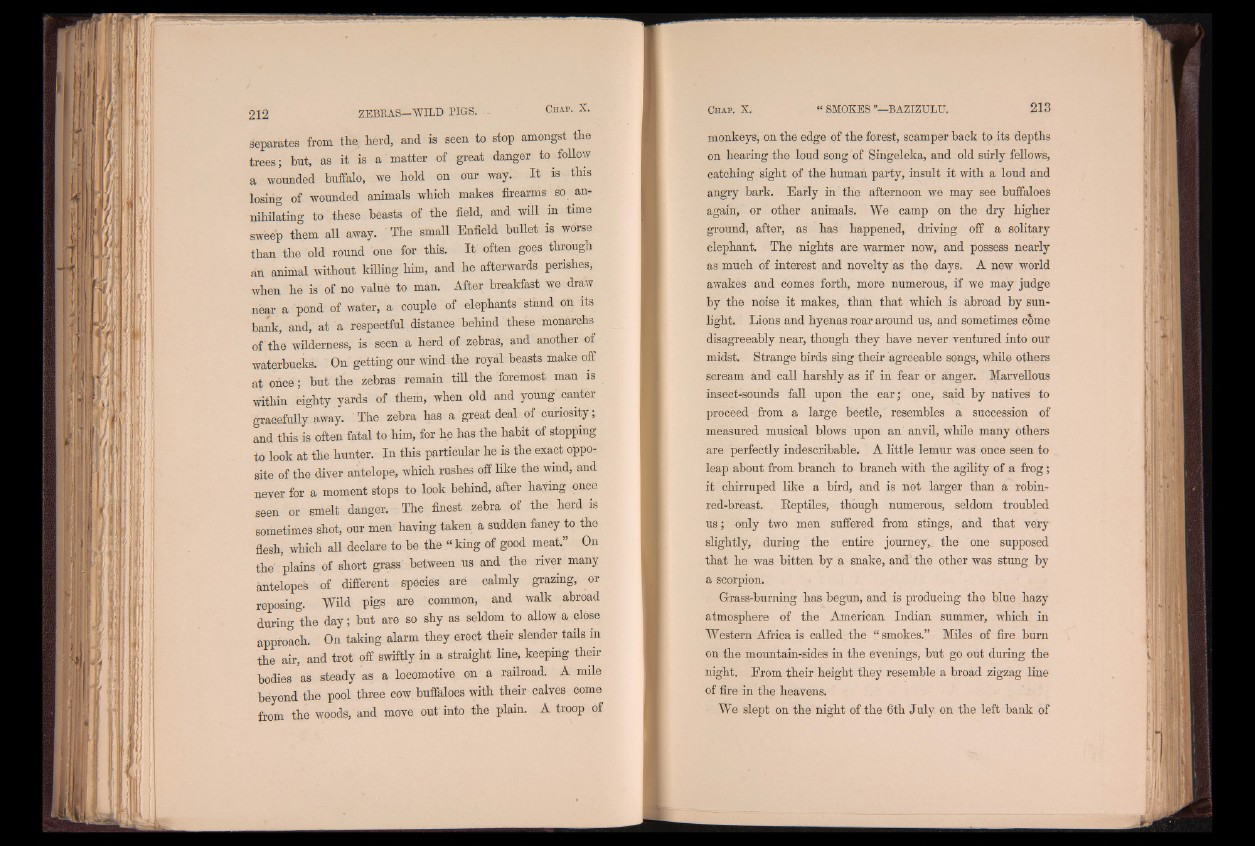
separates from the herd, and is seen to stop amongst the
trees; but, as it is a matter of great danger to follow
a wounded buffalo, we hold on our way. I t is this
losing of wounded animals which makes firearms so annihilating
to these beasts of the field, and will in time
sweep them all away. The small Enfield bullet is worse
than the old round one for this. I t often goes through
an «.Tiimal without killing him, and he afterwards perishes,
when he is of no value to man. After breakfast we draw
near a pond of water, a couple of elephants stand on its
Rn-nTr, and, at a respectful distance behind these monarchs
of the wilderness, is seen a herd of zebras, and another of
waterbucks. On getting our wind the royal beasts make off
at once; but the zebras remain till the foremost man is
within eighty yards of them, when old and young ranter
gracefully away. The zebra has a great deal of curiosity;
and this is often fatal to him, for he has the habit of stopping
to look at the hunter. In this particular he is the exact opposite
of the diver antelope, which rushes off like the wind, and
neyer for a moment stops to look behind, after haying once
seen or smelt danger. The finest zebra of the herd is
sometimes shot, our men having taken a sudden fancy to the
flesh, which all declare to be the “ king of good meat.” On
the' plains of short grass between us and the river many
antelopes of different spéciés aré calmly grazing, or
reposing. Wild pigs are common, and walk abroad
during the day; but are so shy as seldom to allow a close
approach. On taking alarm they erect their slender tails m
the air, and trot off swiftly in a straight line, keeping their
bodies as steady as a locomotive on a railroad. A mile
beyond the pool three cow buffaloes with their calves come
from the woods, and move out into the plain. A troop of
monkeys, on the edge of the forest, scamper back to its depths
on hearing the loud song of Singeleka, and old surly fellows,
catching sight of the human party, insult it with a loud and
angry bark. Early in the afternoon we may see buffaloes
again, or other animals. We camp on the dry higher
ground, after, as has happened, driving off a solitary
elephant. The nights are warmer now, and possess nearly
as much of interest and novelty as the days. A new world
awakes and comes forth, more numerous, if we may judge
by the noise it makes, than that which is abroad by sunlight,
Lions and hyenas roar around us, and sometimes come
disagreeably near, though they have never ventured into our
midst. Strange birds sing their agreeable songs, while others
scream and call harshly as if in fear or anger. Marvellous
insect-sounds fall upon the ear; one, said by natives to
proceed from a large beetle, resembles a succession of
measured musical blows upon an anvil, while many others
are perfectly indescribable. A little lemur was once seen to
leap about from branch to branch with the agility of a frog;
it chirruped like a bird, and is not larger than a robin-
red-breast. Reptiles, though numerous, seldom troubled
us; only two men Suffered from stings, and that very
slightly, during the entire journey,, the one supposed
that he was bitten by a snake, and; the other was stung by
a scorpion.
Grass-burning has begun, and is producing the blue hazy
atmosphere of the American Indian summer, which in
Western Africa is called the “ smokes.” Miles of fire burn
on the mountain-sides in the evenings, but go out during the
night. From their height they resemble a broad zigzag line
of fire in the heavens.
We slept on the night of the 6th July on the left bank of